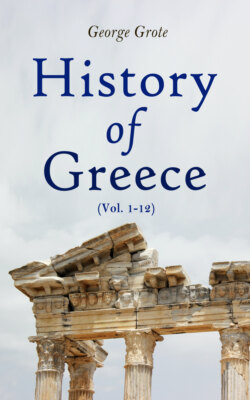Читать книгу History of Greece (Vol. 1-12) - Grote George - Страница 49
На сайте Литреса книга снята с продажи.
Оглавление1050 The following passage, from the Preface of Mr. Price to Warton’s History of English Poetry, is alike just and forcibly characterized; the whole Preface is, indeed, full of philosophical reflection on popular fables generally. Mr. Price observes (p. 79):—
“The great evil with which this long-contested question appears to be threatened at the present day, is an extreme equally dangerous with the incredulity of Mr. Ritson,—a disposition to receive as authentic history, under a slightly fabulous coloring, every incident recorded in the British Chronicle. An allegorical interpretation is now inflicted upon all the marvellous circumstances; a forced construction imposed upon the less glaring deviations from probability; and the usual subterfuge of baffled research,—erroneous readings and etymological sophistry,—is made to reduce every stubborn and intractable text to something like the consistency required. It might have been expected that the notorious failures of Dionysius and Plutarch, in Roman history, would have prevented the repetition of an error, which neither learning nor ingenuity can render palatable; and that the havoc and deadly ruin effected by these ancient writers (in other respects so valuable) in one of the most beautiful and interesting monuments of traditional story, would have acted as sufficient corrective on all future aspirants. The favorers of this system might at least have been instructed by the philosophic example of Livy,—if it be lawful to ascribe to philosophy a line of conduct which perhaps was prompted by a powerful sense of poetic beauty,—that traditional record can only gain in the hands of the future historian by one attractive aid,—the grandeur and lofty graces of that incomparable style in which the first decade is written; and that the best duty towards antiquity, and the most agreeable one towards posterity, is to transmit the narrative received as an unsophisticated tradition, in all the plenitude of its marvels and the awful dignity of its supernatural agency. For, however largely we may concede that real events have supplied the substance of any traditive story, yet the amount of absolute facts, and the manner of those facts, the period of their occurrence, the names of the agents, and the locality given to the scene, are all combined upon principles so wholly beyond our knowledge, that it becomes impossible to fix with certainty upon any single point better authenticated than its fellow. Probability in such decisions will often prove the most fallacious guide we can follow; for, independently of the acknowledged historical axiom, that ‘le vrai n’est pas toujours le vraisemblable,’ innumerable instances might be adduced, where tradition has had recourse to this very probability to confer a plausible sanction upon her most fictitious and romantic incidents. It will be a much more useful labor, wherever it can be effected, to trace the progress of this traditional story in the country where it has become located, by a reference to those natural or artificial monuments which are the unvarying sources of fictitious events; and, by a strict comparison of its details with the analogous memorials of other nations, to separate those elements which are obviously of a native growth, from the occurrences bearing the impress of a foreign origin. We shall gain little, perhaps, by such a course for the history of human events; but it will be an important accession to our stock of knowledge on the history of the human mind. It will infallibly display, as in the analysis of every similar record, the operations of that refining principle which is ever obliterating the monotonous deeds of violence that fill the chronicle of a nation’s early career, and exhibit the brightest attribute in the catalogue of man’s intellectual endowments,—a glowing and vigorous imagination,—bestowing upon all the impulses of the mind a splendor and virtuous dignity, which, however fallacious historically considered, are never without a powerfully redeeming good, the ethical tendency of all their lessons.”
1051 Varro ap. Censorin. de Die Natali; Varronis Fragm. p. 219, ed. Scaliger, 1623. “Varro tria discrimina temporum esse tradit. Primum ab hominum principio usque ad cataclysmum priorem, quod propter ignorantiam vocatur ἄδηλον. Secundum, a cataclysmo priore ad Olympiadem primam, quod quia in eo multa fabulosa referuntur, Mythicon nominatur. Tertium a primâ Olympiade ad nos; quod dicitur Historicon, quia res in eo gestæ veris historiis continentur.”
To the same purpose Africanus, ap. Eusebium, Præp. Ev. xx. p. 487: Μέχρι μὲν Ὀλυμπιάδων, οὐδὲν ἀκριβὲς ἱστόρηται τοῖς Ἕλλησι, πάντων συγκεχυμένων, καὶ κατὰ μηδὲν αὐτοῖς τῶν πρὸ τοῦ συμφωνούντων, etc.
